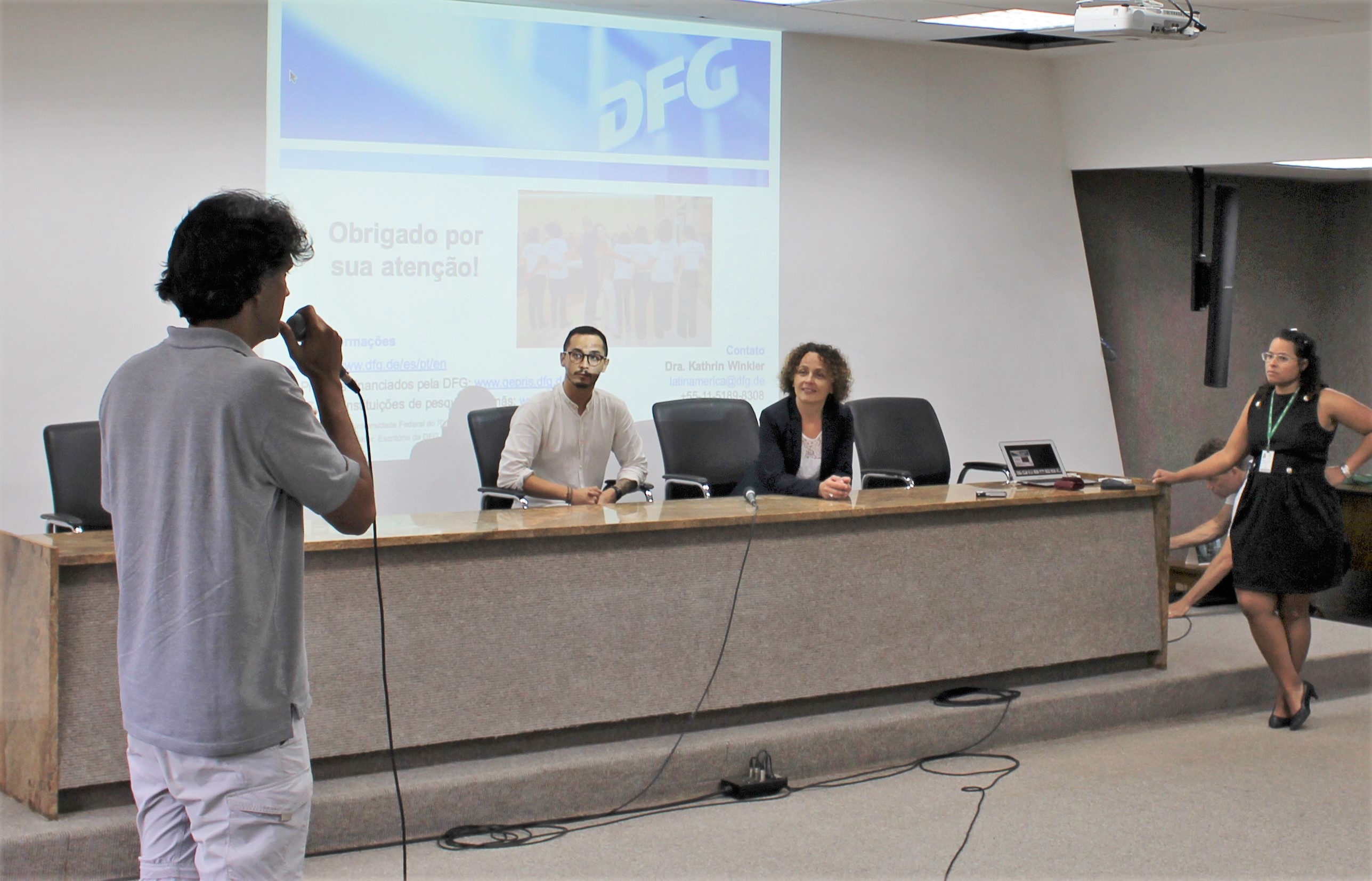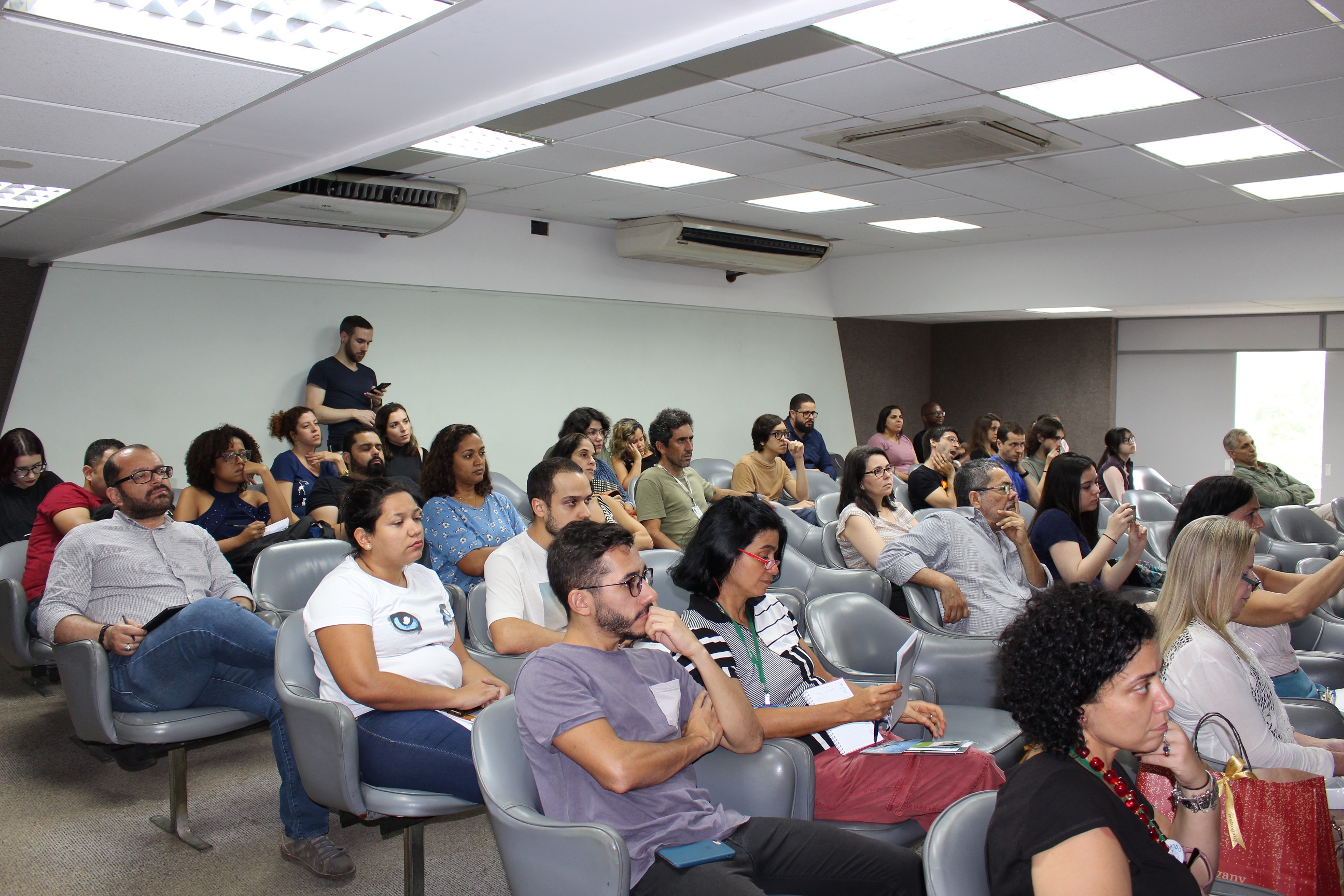DFG Concludes Science Year 2019 in Latin America with UFRJ Event
(20.12.19) At the final event of Science Year 2019 in Latin America, the DFG outlined funding opportunities in Germany for students and researchers from the Federal University of Rio de Janeiro (UFRJ). The university opened its doors to welcome German research institutions on 12 December. The purpose of the event in the CENABIO of UFRJ was to outline the various opportunities for doctoral and postdoctoral researchers to conduct research visits and for scientific cooperation with researchers from German institutions. Options for both short visits and long-term research projects were presented.

Dr. Kathrin Winkler erläutert Forschungsmöglichkeiten in Deutschland
© DFG
The workshop entitled "Opportunities for Doctorate, Postdoctorate and Funding for Cooperation with Scientists at German Institutes and Universities" was held at the Centro Nacional de Biologia Estrutural e Bioimagem (CENABIO), an interdisciplinary research centre of the Federal University of Rio de Janeiro (UFRJ). It has a range of innovative imaging techniques for the purpose of facilitating organismic research as well as research into cells and biomolecules. Around 70 attendees, including university teaching staff, doctoral and postdoctoral researchers, master’s students and students from various disciplines, took advantage of the wide range of opportunities on offer for the funding of research visits and collaborations. In addition to the DFG, representatives of the DAAD, the Alexander von Humboldt Foundation, the Free University of Berlin (FU), the Technical University of Munich (TUM) and the University of Potsdam presented opportunities for studying and research projects in Germany.
Germany is one of the most popular destinations for Brazilian students who want to complete their doctorates abroad or carry out postdoctoral research. During the event, the German universities in attendance had the chance to showcase their scientific fields and explain the required qualifications and the steps that students need to take in order to submit a successful application. It was specifically pointed out that the German language is not an obstacle, as many study programmes can be completed in English.
Prof. Dr. Mônica Santos de Freitas, associate professor at the Institute of Medical Biochemistry of UFRJ, former fellow and current Liaison Scientist of the Alexander von Humboldt Foundation, outlined the research funding opportunities on offer at the institution. She reported that one of the most frequently asked questions is how to go about finding an academic supervisor and a position in Germany to carry out research. In her view, suitable contacts should first be selected using relevant scientific publications. She recommended contacting the authors of these publications directly and asking them about the possibility of cooperation.

Die Teilnehmer besuchen Vorträge über Fördermöglichkeiten in Deutschland
© DFG
Among the research funding opportunities outlined by the DFG, Dr. Kathrin Winkler, Director of the DFG's Latin America Office, presented the possibility of being funded by one’s own research project and of participating in ongoing projects. There are three options for researchers who wish to carry out some or all of their research at a German institution: a position in an ongoing project, funding one’s own position as project manager or a Walter Benjamin position. The latter programme offers funding for a position as a postdoctoral researcher at an early career stage following the completion of a doctorate at a German research institution.
Winkler also outlined opportunities for researchers at universities or research institutions in Latin America to conduct research projects in cooperation with researchers based in Germany, for example bilateral research projects. The resulting scientific cooperation usually entails the involvement of foreign funding agencies. In this case, the DFG supports the German side, while the Brazilian funding agencies see to funding on the Brazilian side.
For research cooperation in Brazil, the DFG has a number of initiatives with state funding agencies, as well as at the federal level in Brazil. It is certainly worth pursuing calls for proposals and publications by the DFG and its Brazilian partner organisations in 2020.